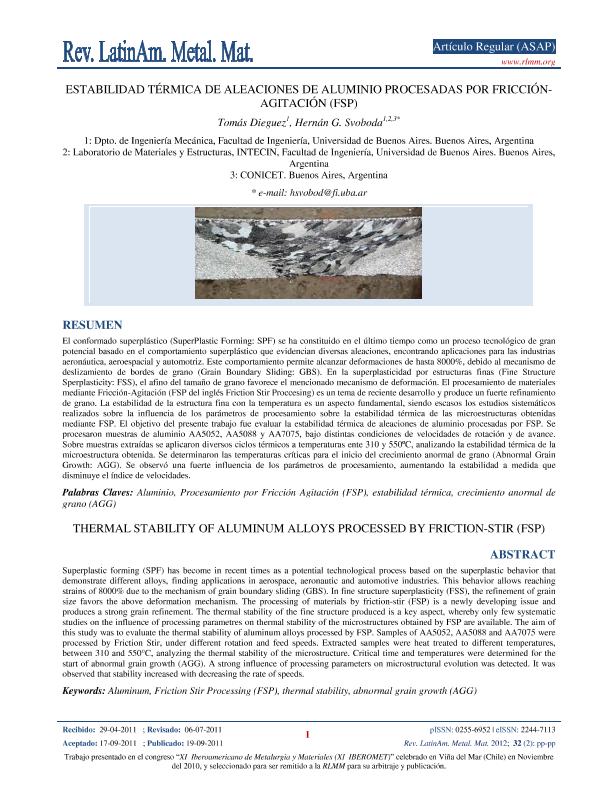Artículo
El conformado superplástico (SuperPlastic Forming: SPF) se ha constituido en el último tiempo como un proceso tecnológico de gran potencial basado en el comportamiento superplástico que evidencian diversas aleaciones, encontrando aplicaciones para las industrias aeronáutica, aeroespacial y automotriz. Este comportamiento permite alcanzar deformaciones de hasta 8000%, debido al mecanismo de deslizamiento de bordes de grano (Grain Boundary Sliding: GBS). En la superplasticidad por estructuras finas (Fine Structure Sperplasticity: FSS), el afino del tamaño de grano favorece el mencionado mecanismo de deformación. El procesamiento de materiales mediante Fricción-Agitación (FSP del inglés Friction Stir Proccesing) es un tema de reciente desarrollo y produce un fuerte refinamiento de grano. La estabilidad de la estructura fina con la temperatura es un aspecto fundamental, siendo escasos los estudios sistemáticos realizados sobre la influencia de los parámetros de procesamiento sobre la estabilidad térmica de las microestructuras obtenidas mediante FSP. El objetivo del presente trabajo fue evaluar la estabilidad térmica de aleaciones de aluminio procesadas por FSP. Se procesaron muestras de aluminio AA5052, AA5088 y AA7075, bajo distintas condiciones de velocidades de rotación y de avance. Sobre muestras extraídas se aplicaron diversos ciclos térmicos a temperaturas ente 310 y 550ºC, analizando la estabilidad térmica de la microestructura obtenida. Se determinaron las temperaturas críticas para el inicio del crecimiento anormal de grano (Abnormal Grain Growth: AGG). Se observó una fuerte influencia de los parámetros de procesamiento, aumentando la estabilidad a medida que disminuye el índice de velocidades. Superplastic forming (SPF) has become in recent times as a potential technological process based on the superplastic behavior that demonstrate different alloys, finding applications in aerospace, aeronautic and automotive industries. This behavior allows reaching strains of 8000% due to the mechanism of grain boundary sliding (GBS). In fine structure superplasticity (FSS), the refinement of grain size favors the above deformation mechanism. The processing of materials by friction-stir (FSP) is a newly developing issue and produces a strong grain refinement. The thermal stability of the fine structure produced is a key aspect, whereby only few systematic studies on the influence of processing parametres on thermal stability of the microstructures obtained by FSP are available. The aim of this study was to evaluate the thermal stability of aluminum alloys processed by FSP. Samples of AA5052, AA5088 and AA7075 were processed by Friction Stir, under different rotation and feed speeds. Extracted samples were heat treated to different temperatures, between 310 and 550°C, analyzing the thermal stability of the microstructure. Critical time and temperatures were determined for the start of abnormal grain growth (AGG). A strong influence of processing parameters on microstructural evolution was detected. It was observed that stability increased with decreasing the rate of speeds.
Estabilidad térmica de aleaciones de aluminio procesadas por fricción agitación (FSP)
Título:
Thermal stability of aluminum alloys processed by friction-stir (FSP)
Fecha de publicación:
02/2012
Editorial:
Universidad Simón Bolívar
Revista:
Revista Latinoamericana de Metalurgia y Materiales
ISSN:
0255-6952
e-ISSN:
2244-7113
Idioma:
Español
Tipo de recurso:
Artículo publicado
Clasificación temática:
Resumen
Palabras clave:
Aluminio
,
FSP
,
AGG
,
Estabilidad Térmica
Archivos asociados
Licencia
Identificadores
Colecciones
Articulos(SEDE CENTRAL)
Articulos de SEDE CENTRAL
Articulos de SEDE CENTRAL
Citación
Dieguez, Tomás; Svoboda, Hernán Gabriel; Estabilidad térmica de aleaciones de aluminio procesadas por fricción agitación (FSP); Universidad Simón Bolívar; Revista Latinoamericana de Metalurgia y Materiales; 32; 2; 2-2012; 225-235
Compartir




